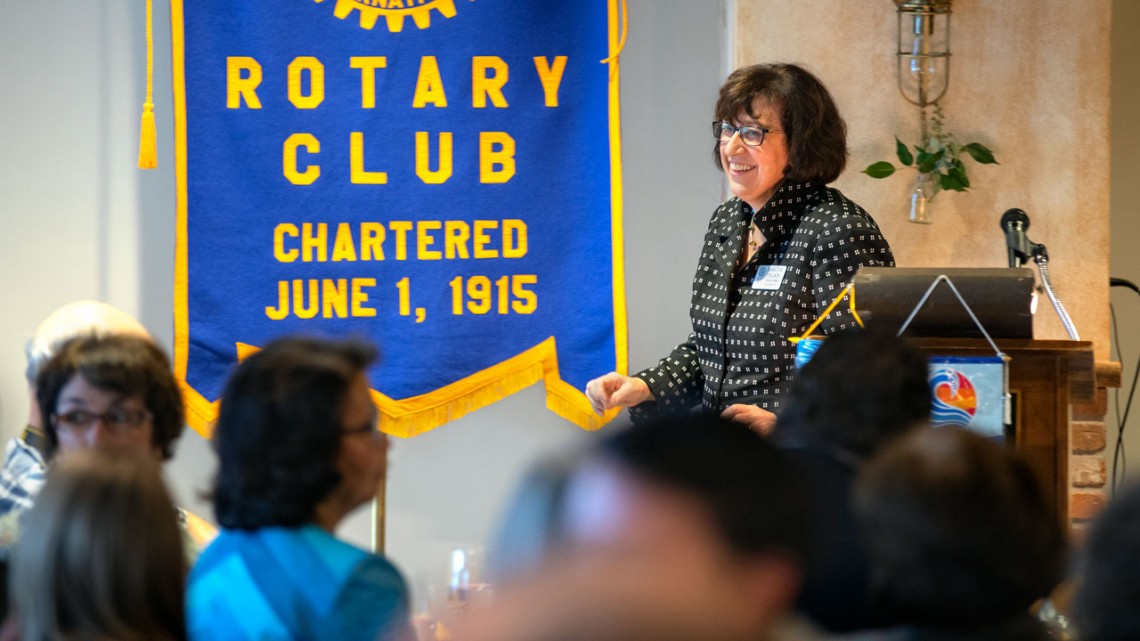
Cornell President Martha E. Pollack speaks to the Rotary Club of Ithaca Nov. 7 at the Coltivare Bistro.
Pollack highlights Cornell, Rotary similarities
By Nancy Doolittle
In her first remarks to the Rotary Club of Ithaca Nov. 7, Cornell President Martha E. Pollack noted the ways the university’s key priorities – especially its commitment to diversity and engagement – intersect with the mission and priorities of Rotary.
As a land-grant institution, Cornell improves not only the lives of its students, but also the communities and nations where they live and work, Pollack said, noting, “Our goal is to support a thriving culture of open-mindedness and intellectual rigor.” By encouraging creativity, teamwork and problem-solving, Cornell prepares students to be responsible citizens and leaders, she said.
“Like Rotary, Cornell has a foundational commitment to diversity,” Pollack said. “The value of diversity goes far beyond equality of access, whether to the worldwide network of Rotary, or to a world-class education at Cornell.” This focus on diversity and inclusion – welcoming students and faculty from all backgrounds and working to create a campus climate in which every member is valued – does more than create a better environment for Cornell students, Pollack said; it reflects and prepares them for the “global community that is more connected today than it ever was before.”
Both organizations also value engagement at local and global levels. “Cornell doesn’t exist just for Cornell any more than Rotary exists just for Rotary,” Pollack said. She highlighted Cornell students who have brought their classroom learning into communities and the work of Cornell’s Office of Engagement Initiatives and Engaged Cornell Hub for bringing faculty, students and community partners together.
Pollack lauded this year’s Rotary theme, “Be the Inspiration,” as another intersection between the two organizations: “Engaging with our communities, expanding our own knowledge and the boundaries of human knowledge, and finding new and innovative ways to make lives better with what we’ve learned – to me that is what Cornell is all about, and what could be more inspiring than that?”
Mary F. Berens ’74, former director of Cornell alumni affairs and current president of the Rotary Club of Ithaca, asked, through a show of hands, how many in the room were or had been faculty, students or staff at Cornell, or were neighbors or friends of someone who was. Almost everyone in the room responded.
Audience queries following Pollack’s remarks focused on other town and gown intersections: bike-sharing programs; the expected impacts of planned North Campus residence halls on nearby residential areas; and the reasoning behind the expansion of on-campus housing. Other questions concerned academic and research integrity; politics in an academic environment; and what it means to be committed to “… any person … any study.”
In response to a question about Cornell’s vision for the next 20 years, Pollack noted the long-term capital and budget planning the university has done, as well as four strategic priorities: building on Cornell’s academic distinction; increasing educational “verve”; promoting diversity, inclusion and equity; and becoming “One Cornell,” by creating synergies between the Ithaca, Weill Cornell Medicine and Cornell Tech campuses.
Looking ahead, Pollack invited Rotary members to the annual Town-Gown Awards at Ithaca High School on Dec. 8 to celebrate town-gown collaborations.
Media Contact
Get Cornell news delivered right to your inbox.
Subscribe
